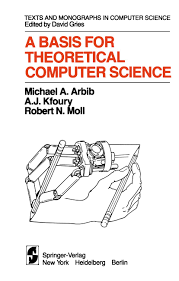“A Basis for Theoretical Computer Science” by Michael A. Arbib, Ernest G. Manes, and Michael A. Papalaskari provides a comprehensive introduction to the foundational concepts of theoretical computer science. The book covers a wide range of topics essential to understanding the theoretical underpinnings of computation, including formal languages, automata theory, computability, and complexity theory.
The authors start with an exploration of formal languages and grammars, introducing key concepts such as regular expressions and context-free grammars. They then delve into automata theory, discussing finite automata, pushdown automata, and Turing machines, and their relationships to different classes of languages.
The book also addresses computability theory, examining the limits of what can be computed by Turing machines and other computational models. It covers topics such as the halting problem, undecidability, and the Church-Turing thesis.
Finally, the authors explore complexity theory, which deals with the resources required to solve computational problems. They introduce important complexity classes such as P, NP, and NP-completeness, and discuss topics such as polynomial-time reductions and the P vs. NP problem.
Overall, “A Basis for Theoretical Computer Science” serves as a thorough introduction to the fundamental concepts and theoretical frameworks that underlie modern computer science. It provides a solid foundation for further study and research in theoretical computer science.
